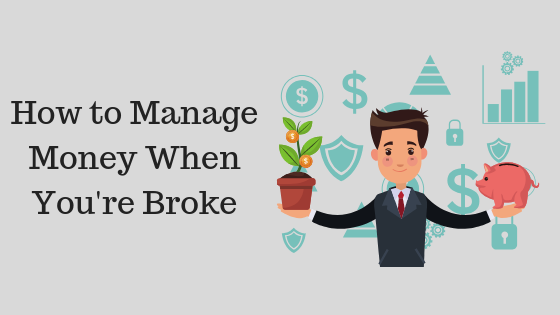
Crafting a household budget is never easy, but it can be especially difficult when you don’t have enough income to pay even your most basic bills. It might be because you’re between jobs or currently have a job that doesn’t pay well enough to address all of your expenses. Either way, it’s especially important to change the way you spend money when you’re short on funds.
Follow these simple steps to effectively manage money when you’re seriously broke:
1. Be proactive.
Do not wait until the collection agencies start calling. They are relentless and not known for being understanding. They will only get paid when you pay up. It’s simply where their priorities lie.
● Call your creditors as soon as you can see that you won’t be able to make a payment. You may be able to work out an extension or arrangement for reduced payments if you get to them first.
2. Prioritize.
List your bills according to importance. Typically, your rent or mortgage, basic utilities, insurance, and groceries will come first. Credit cards should be last on the list. Rank them from highest interest rate to the lowest.
● Consider the consequences of not paying each bill. You need to make a decision about who gets paid first and who has to wait.
● Do this step only after you’ve contacted your creditors individually. Your decisions may be different depending on their response to your inquiries. This is also the time to ruthlessly cut all your unnecessary expenses. Budgetary austerity has a time and place. That time is now.
3. Cut back on your savings plan, for now.
Every penny of your paycheck needs to go toward getting some bills and debts off your plate permanently. Only once you can meet your basic obligations alongside some savings should you start a savings program again.
● While you’ve always heard to pay yourself first, there are times when that’s just not appropriate.
4. Avoid using credit.
It’s extremely easy to start using credit cards in lieu of cash that you don’t have. The cost of accessing this money now will be extremely high and could be very difficult to pay off later. Totally avoid falling into this trap.
● Consider the amount you’re normally able to save to project how long it would take to pay off this new debt. You already have more payments than you can make without adding future debts to the equation.
5. Create additional income.
If you don’t have a job, take just about any job you can get for the time being. If you already have a job, consider adding a second income or find some overtime pay. If you have stuff lying around the house that you’re not in need of, it might be a good idea to sell it.
● Avoid falling behind now, so you won’t have to catch up later.
6. Make a new budget and stick to it.
This might be the last thing you’re in the mood for, but if your financial circumstances don’t change, your current budget will never work. Analyze your income and bills and make wise choices. It’s all about prioritizing intelligently.
In stressful times like these, it’s easy to succumb to anxiety and neglect taking action. This course of action will only make for greater challenges in the future.
Take a deep breath and work out everything you can do to get yourself back on track financially. You will be surprised at how much you can accomplish when you focus your mindset on solutions.
Prioritize your expenses, increase your income, and create a new budget. Things will be much better before long.


